#Heidelberg Catechism
Text
I've only just begun my study of the Heidelberg Catechism, but I found myself thinking of the first question during communion this morning:
"I am not my own, but belong with body and soul, both in life and in death, to my faithful Savior Jesus Christ. He has fully paid for all my sins with his precious blood, and has set me free from the power of the devil."
That combined with the first question of the Westminster Shorter Catechism:
"Man's chief end is to glorify God, and to enjoy him forever."
And that's what I'm supposed to enjoy, isn't it? That I am not my own. I am a slave who belongs, body and soul, to my Savior. I was bought with a price that set me free from the power of the devil.
(We sang Psalm 40 again this morning, and after last week, I will never look at it the same way again. "You seek no offering, desire no sacrifice; but you have given me an opened, ready ear." An ear that will not just listen to my cry for help, but is ready to be driven through, marking Him as a slave so I may go free.)
#christianity#heidelberg catechism#westminster shorter catechism#exodus' slave laws traumatized me#but like...in a good way
3 notes
·
View notes
Text
The Heidelberg Catechism is a very beautiful work. I especially enjoyed part 3, which focuses on Gratitude
#christian#christianity#catechism#heidelberg catechism#reformed#reformed theology#my post#protestant#christblr
0 notes
Text
Enjoying God
On the heels of last week’s thoughts around conversational intimacy with God, this past week I felt God impressing upon my heart how much I enjoy my relationship with Him, and that I should tell you about that.
Enjoy God? you may wonder. How is that possible? What does that even look like?
These are natural questions, especially in light of the mental image of God we probably all grew up with:…

View On WordPress
0 notes
Text

0 notes
Text
The Ten Commandments (Exodus 20:1-21)
Since relationships are important and necessary, we need a way to be in community together so that everyone can get along and thrive as human beings.
The Ten Commandments by He Qi
Then God gave the people all these instructions:
“I am the Lord your God, who rescued you from the land of Egypt, the place of your slavery.
“You must not have any other god but me.
“You must not make for yourself an idol of any kind or an image of anything in the heavens or on the earth or in the sea. You must not bow down to them or worship them, for I,…

View On WordPress
#decalogue#exodus#exodus 20#freedom#god&039;s instructions#god&039;s commands#heidelberg catechism#interpersonal relations#moses#relational connection#relationships#social expectations#social relationships#spiritual life#ten commandments#ten words
0 notes
Link
The Heidelberg Catechism is one of the most beloved and well used catechisms to emerge from the sixteenth and seventeenth century Reformation. Published in its final form in 1563, the catechism has been used by millions of Christians to teach the faith...
#Heidelminicast#Heidelberg Catechism 96—What Is God’s Rule Of Worship?#The Heidelberg Catechism#heidelblog.net
5 notes
·
View notes
Text
The Constitution of the Presbyterian Church (U.S.A.)
I am a member and non-ruling elder of Westminster Presbyterian Church (Minneapolis), which is a member of the Presbyterian Church (U.S.A.) denomination. The latter’s Constitution consists of the following two parts.
Part I: The Book of Confessions
This Book contains the following confessions:
The Nicene Creed (A.D. 381)
The Apostles’ Creed (A.D. 180)
The Scots Confession (1560)
The Heidelberg…
View On WordPress
#A Brief Confession of Faith#Directory for Worship#Minneapolis Westminster Presbyterian Church#Presbyterian Book of Confessions#Presbyterian Book of Order#Presbyterian Church (U.S.A.)#Presbyterian Principles: God alone is Lord of the Conscience#Presbyterian Principles: It is our duty to exercise mutual forbearance toward each other#Presbyterian Principles: Truth is in order to goodness#Rules of Discipline#The Apostles’ Creed#The Confession of 1967#The Confession of Belhar#The Form of Government#The Foundations of Presbyterian Polity#The Heidelberg Catechism#The Larger Catechism#The Nicene Creed#The Scots Confession#The Second Helvetic Confession#The Shorter Catechism#The Theological Declaration of Barmen#The Westminster Confession of Faith
0 notes
Text
popping my head through your window (and possibly shattering the glass woops) to say: I am alive! I've been spending time with family, studying (I can safely say now that Professor Joy is the best and I would 10/10 follow her back to England to take her course at King's College if it weren't for the financial part. She was SO lovely and her class was amazing), preparing for fall classes, chipping away steadily at my essays and my fairy tale novel, hammering out the occasional blog post or poem, cooking, sleeping (or trying to, anyway), doing social things (I had one thing almost every day this week and it just about killed me. Thank God the person I was supposed to meet up with today cancelled, otherwise I'd be pretty much dead), reading TONS (am currently reading Sophie's World, War and Peace, Aggressively Happy, Jamie Smith's On the Road, Gordon Fee's How to Read the Bible for All Its Worth, and the Heidelberg Catechism for kicks, as well as working my way through a few class readings), and have caught up with a few stories I meant to catch up with (in other words: went to watch Barbie in the theatres, which was brilliant and not what I expected, and finished The Bear season 2, which.... I don't know, guys, it was a Lot). Things have been BUSY on the school front and many concerning things have been revealed BUT all is well and all shall be well!!
I shall be back in September. At present things are still SUPER busy. But I shall keep y'all in my prayers! Miss you and love you!!
#this fall semester is going to be Interesting#(@gracie you thought i had tons of midterms last year?? girl i'm taking FIVE english classes this semester....... i'm literally going to be#up to my eyebrows in midterm essays tests and exams in a handful of months)#anywayyyy it has been intermittently emotionally draining because previous church drama#also i have not yet chosen a church to attend which is suchhhh a hard decision to make. after the last one i've found that i'm actually a#lot more reluctant/hesitant/scared to commit to a church out of fear of being unpleasantly surprised again#but i'm trying to work through that!#but overall everything is fine and i am slowly getting up to speed on a lot of things i was behind on#God is good y'all! and very kind in the midst of all This!
28 notes
·
View notes
Text
Lord, I Believe! Help My Unbelief!
In Mark 9:14-29, the weakness and limit of men is demonstrated, especially with regard to faith, and so is the answer to men's weakness:
Luke 17:5 (KJV), "And the apostles said unto the Lord, Increase our faith."
Mark 9:24, "And straightway the father of the child cried out, and said with tears, Lord, I believe; help thou mine unbelief."
“A weak faith may also be true faith, when it is otherwise of the right kind. A fire is not at once a bright blazing flame, but it often starts with a single spark.” - Otto Thelemann, An Aid to the Heidelberg Catechism, 79
Hebrews 12:2a, "Looking unto Jesus the author and finisher of our faith."
Notice what the Epistle to the Hebrews tells us, that Christ doesn't just finish or complete it but is the one who gives us the faith to begin with. This is why the Westminster Shorter Catechism puts it this way:
Question 86: What is faith in Jesus Christ?
Answer: Faith in Jesus Christ is a saving grace, whereby we receive and rest upon him alone for salvation, as he is offered to us in the gospel.
It is a saving grace, meaning it wholly begins with the gracious act of God, and doesn't begin with man or his acceptance. It is strengthened by Christ who works it in us by His Spirit completing that work at our death.
Praise God, our salvation relies not upon any faith made by the strength of men, but on a faithful Savior who is powerful, mighty, and gracious to save sinners.

5 notes
·
View notes
Photo
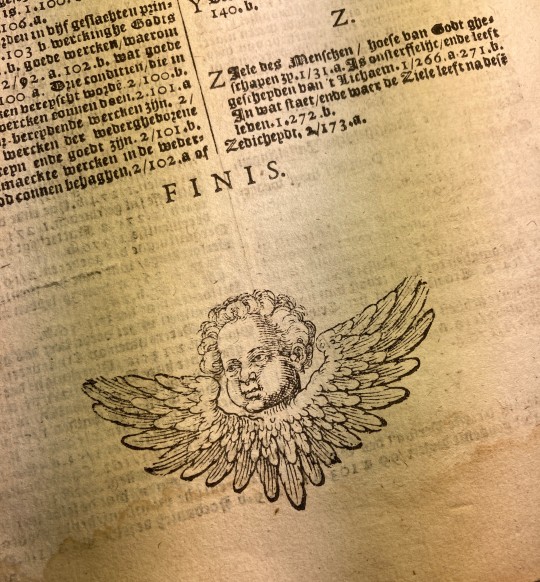
Forehead Finis Friday
Is it just us or does this fellow found at the end of a 17th century Dutch commentary on the Heidelberg Catechism look...older than the usual finis cherub? Also notable: the wings in one piece (a uni-wing??).
Ursinus, Zacharias. Het schat-boeck der verclaringhen over de catechismus der christelicke religie. Leyden: Andries Couck, 1630.
28 notes
·
View notes
Note
Heidelberg is so good!!
It really is! Not sure how quickly I'll be moving through it, but I'm excited for what I might learn.
0 notes
Text
The Hamiltons and their Dutch Reformed wedding
[Text from Religions of the United States in Practice, Volume 1].

Alexander Hamilton and Elizabeth Schuyler were married on Thursday, December 14, 1780, in the largest parlor of her parents’ Albany mansion, by a minister of the Dutch Reformed Church, as is recorded in the church registry of the Reformed Dutch Church of Albany (now First Church in Albany). Domine Eilardus Westerlo,* the second husband of Catharina Livingston Van Rensselaer (mother of Stephen Van Rensselaer III) had presided at Angelica and John Church’s wedding at the Van Rensselaer Manor house north of Albany three years prior, but it’s unknown to me if he also was the minister for the Hamilton wedding.
It’s easy to speculate that AH, at least, thought that he and Eliza would be married at Morristown that spring 1780 - it was not common to have an engagement lasting several months, and it would have made sense to get married before the campaign. Morristown had both Anglican and Presbyterian ministers. But Philip Schuyler poured cold water on that, stating in a letter that it would not be proper for them to be married at Morristown (and certainly, not to elope). In one of his letters to his fiancee AH complains that their engagement has lasted “an age,” and in another asks if she would still like to elope - it’s easy to see that he was going along with this delay to make her family happy.
If AH, who stated in 1771 that he was a member of the English Reformed Church, and then had ties through Rev. Knox to the Scotch Presbyterian Church, had mixed feelings about marrying in the Dutch Reformed tradition, it is unrecorded, although he is quoting from the Anglican marriage rite in his Oct 1780 letter to Eliza and his reference to “nuptial benediction” is from Anglicanism (I wonder if he grimaced when he read this totally non-poetic marriage rite below, compared to this one). He and Eliza’s first child, Philip, was baptized at the Reformed Dutch Church of Albany on Feb 11, 1782, with Philip’s grandparents as witnesses. And maybe AH really took the marital admonitions from this Liturgy (quoting Matthew 19) to heart [see page 3 below], as he supported folks only being allowed to divorce in the case of adultery (not for cruelty, not for abandonment), which remained NY state law until 1967.
So let’s talk cool facts about the Dutch Reformed tradition in America:
One book that every (Dutch American) colonial family was certain to possess was a kerkboekje (church book) - containing the Dutch metrical Psalter (with the Genevan tunes), the Heidelberg Catechism, and the Netherlands Liturgy - which they carried with them to church every Sunday. In more well-to-do families, every person had a kerboekje of his or her own. Because of their high birth rate, Dutch Americans were able to maintain their language and culture under the English regime for another century. Their culture was so tenacious that the French and German immigrants who later settled in the Hudson Valley adopted Dutch as their language rather than English. [Here I interject that Sojourner Truth, born into slavery in 1797 in Swartekill, NY, was a native Dutch speaker who likely never lost that accent - her “Ain’t I a Woman?” speech was translated to a Southern dialect.]
After a hundred years of English rule, however, Dutch eventually lost its place as the language of New York and New Jersey.
English language preaching was introduced in 1763, and the church book was translated to English in 1767, becoming the New York Liturgy that became standard across all English-speaking Dutch Reformed Churches in the world. (Services in Albany would stay in Dutch through most of the 1780s, although I’m certainly hoping that their wedding wasn’t in Dutch, a language that I don’t believe we have any record of AH speaking.) This language certainly doesn’t have the flourishes of the Anglican liturgy - it’s pretty appalling from a literary point of view.
We know that Dutch women enjoyed stronger inheritance rights and a more elevated status than did their English peers. In cases of Dutch-English intermarriage, the couples usually ended up Dutch Reformed.
Obviously not the Hamiltons, who after Philip would baptize their next three children in the Episcopal Church (the Anglican Church of the USA) in 1788; the Hamiltons would remain Episcopalians for generations. Angelica Schuyler Church also became Episcopalian (and is the one we actually have a contemporary record of going to church with her own and the Hamilton children, other than presumed attendance for baptisms and at the 1st inauguration of GW), which makes total sense since she married an Englishman. It also makes sense that AH would return to the religious liturgies of his youth [See my lengthy post about the Hamiltons’ religious preferences.]
Getting back to the wedding stuff - although this researcher states that marriages were usually in church, I suspect that was for the plebs. Other books cite wealthy Dutch-Americans marrying at their homes, and then the bride wearing her finest outfit to church on the Sunday following her wedding. I have never found a reference to the Schuylers as a particularly pious family, nor have I found a reference to Philip Schuyler maintaining a pew for his family at the church in Albany. His youngest daughter does not cite him as an attendant, but as someone who kept private devotions and would sometimes recite a prayer service for the household (this was not at all uncommon).
Dutch American weddings were big, community, raucous affairs, almost everyone agrees. “Complaints about carousing and excessive drunkenness were not uncommon.” Philip and Catharine likely wanted to throw such a party!
Although they clearly wanted to witness and then throw a crazy party afterwards, Elizabeth’s parents would have played no role in the wedding itself. There was no giving away of the bride as there is in the Anglican rite, where the father (usually) affirms that he is giving “this woman to be married to this man.” Instead, this was a ceremony for two grown sober adults, choosing to live in the Married State, the Institution of God [see below].
Anyway, getting to the real point: below are my not-good photos of the form of marriage of the New York Liturgy. Considering the dates of this liturgy, this is likely what was read to and said by the Hamiltons at their wedding. This has some typical Reformed catechesis - “God will...judge and punish Whoremongers and Adulterers,” “Resist all Wickedness,” “Believe these Words of Christ, and be certain and assured, that our Lord God had joined you together in this holy State. You are therefore to receive, whatever befalls you therein with Patience and Thanksgiving, as from the Hand of God, and thus all Things will turn to your Advantage and Salvation.” It even starts off with such a great tone: “Whereas Married Persons are generally, by Reason of Sin, subject to many Troubles and Afflictions...”
A line that is unfamiliar to me from other Christian marriage rites: “[to the husband]..you are to labor diligently and faithfully, in the calling wherein God hath set you, that you may maintain your Household honestly, and likewise have something to give to the poor” [my emphasis]. And I am unaware of any other major Christian marriage rite that so blatantly states St. Paul’s admonition to get married to avoid fornication. Calvinism can be so grim (my apologies to any Calvinists reading this, but not really).

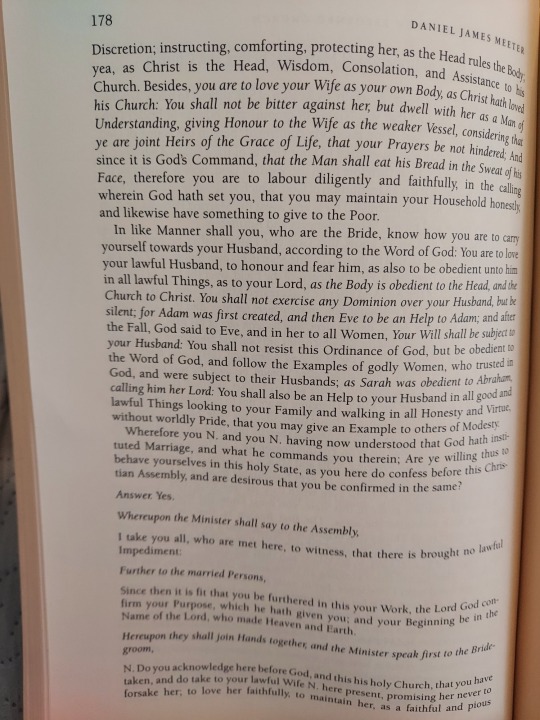
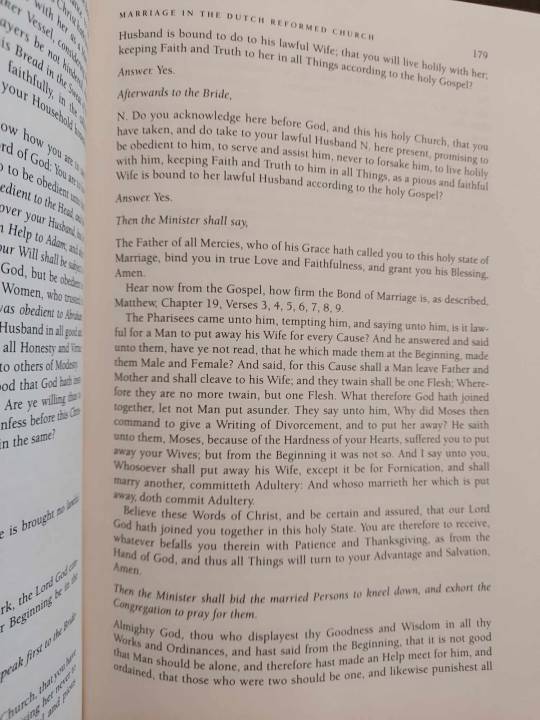
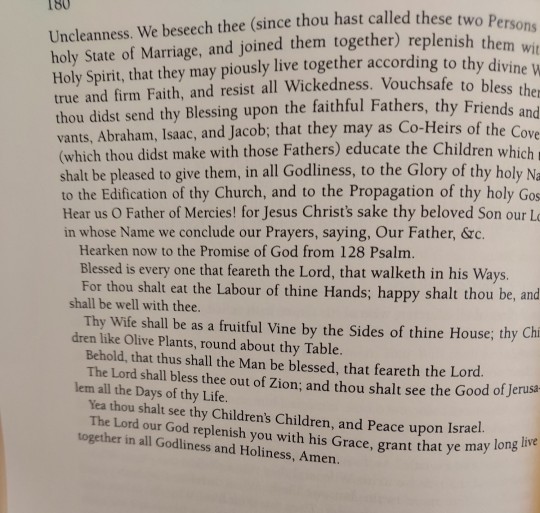
If you’ve made it this far, perhaps you’d also like to read about Dutch epithalamia. Epithalamia were wedding poems/songs - more specifically, for the marital bed/consummation - that were popular all the way from the classical period (they likely arose from the very elaborate wedding rituals of the past ancient Greeks/Balkan peoples) but largely disappeared in the late 19th century and have now been forgotten. There was quite a lot of literature/pamphlets/instruction manuals(?) about how to approach one’s wedding night; epithalamia was the far more naughty/raucous cousin to this literature. But I don’t think anyone really took some of this literature seriously:
...The chapter titled ‘Bruyt’ (Bride) highlights how respectable Protestants wished newly-weds the joys of a chaste Christian marriage and advocated the creation of a devotional atmosphere before becoming one flesh. Cats’s instructions about the wedding day cover various topics, such as the behaviour of the wedding guests, the bride and groom’s mental preparation, orchestrating the mood of the wedding banquet, the symbolic meaning of the bride’s crown, conduct at the nuptial bed, and pious conversation between bride and groom.
* h/t to Dr. Tom Cutterham for this, who is also working on a biography (and working to get a publisher for said biography) on Angelica Schuyler Church “which explores the processes of bourgeois class-formation in this period through the lens of her ideas, exploits, and transatlantic voyages.” He’s already released some of his research/early thoughts on “The Labor of Bourgeois Sexuality” during this period, or listen to the podcast, in which he reads from a section of his biography on ASC’s social climbing to get her husband into Parliament, including a ‘risque’ section of a letter from Baron von Steuben to Church.
#Alexander Hamilton#Elizabeth Schuyler Hamilton#Dutch Reformed Church#18th century marriage#Angelica Schuyler Church
8 notes
·
View notes
Text
What is your only comfort in life and death?
That I am not my own, but belong with body and soul, both in life and in death, to my faithful Savior Jesus Christ. He has fully paid for all my sins with His precious blood, and has set me free from all the power of the devil. He also preserves me in such a way that without the will of my heavenly Father not a hair can fall from my head; indeed, all things must work together for my salvation. Therefore, by His Holy Spirit He also assures me of eternal life and makes me heartily willing and ready from now on to live for Him
—Q1, Heidelberg Catechism
7 notes
·
View notes
Text
Acts 1:1-11 – Ascension of the Lord
“At his Ascension, our Lord entered Heaven, and he keeps the door open for humanity to enter.” Oswald Chambers
In my first book I told you, Theophilus, about everything Jesus began to do and teach until the day he was taken up to heaven after giving his chosen apostles further instructions through the Holy Spirit. During the forty days after he suffered and died, he appeared to the apostles from time to time, and he proved to them in many ways that he was actually alive. And he talked to them about the…

View On WordPress
#acts 1#acts of the apostles#ascension#ascension day#ascension of the lord#christ&039;s ascension#christian discipleship#christian faith#christian life#christian ministry#christian spirituality#christian year#christianity#church calendar#disciples#good news#heidelberg catechism#jesus christ#king jesus#kingdom of god#lord jesus#lord&039;s return#lordship of christ#redemption#salvation
1 note
·
View note
Text
Yes, He Really Does Hold Your Life and Your Future in His Hands
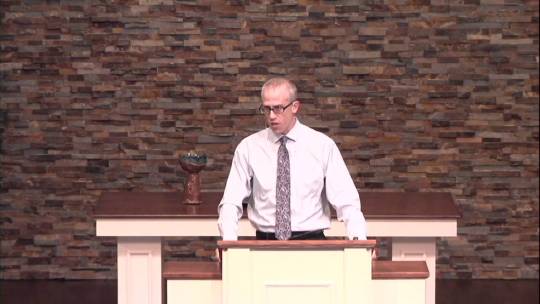
by Kevin DeYoung
Q. What do you understand by the providence of God?
A. Providence is the almighty and ever present power of God by which he upholds, as with his hand, heaven and earth and all creatures, and so rules them that lead and blade, rain and drought, fruitful and lean years, food and drink, health and sickness, prosperity and poverty—all things, in fact, come to us not by chance but from his fatherly hand (Heidelberg Catechism Q/A 27).
This is my favorite Lord’s Day in the entire Catechism. I absolutely love its poetic description of providence. ”Sovereignty” is the word we hear more often. That’s a good word too. But if people run out of the room crying whenever you talk to them about sovereignty, try using the word “providence.” For some people God’s sovereignty sounds like nothing but raw, capricious power: “God has absolute power over all things and you better get used to it.” That kind of thing. And that definition is true in a sense, but divine sovereignty, we must never forget, is sovereignty-for-us. As Eric Liddel’s dad remarked in Chariots of Fire, God may be a dictator, but “Aye, he is a benign, loving dictator.”
Coming to grips with God’s all-encompassing providence requires a massive shift in how we look at the world. It requires changing our vantage point—from seeing the cosmos as a place where man rules and God responds, to beholding a universe where God creates and constantly controls with sovereign love and providential power.
The definition of providence in the Catechism is stunning. All things, yes all things, come to us not by chance but from his fatherly hand.” I will sometimes ask seminary students being examined for ordination, “How would the Heidelberg Catechism, particularly Lord’s Day 10, help you minister to someone who lost a limb in Afghanistan or just lost a job or just lost a child.” I am usually disappointed to hear students who should be affirming the confessions of their denomination shy away from Heidelberg’s strong, biblical language about providence. Like most of us, the students are much more at ease using passive language about God’s permissive will or comfortable generalities about God being “in control” than they are about stating precisely and confidently to those in the midst of suffering “this has come from God’s fatherly hand.” And yet, that’s what the Catechism teaches.
And more importantly, so does the Bible.
To be sure, God’s providence is not an excuse to act foolishly or sinfully. Herod and Pontius Pilate, though they did what God had planned beforehand, were still wicked conspirators (Acts 4:25-28). The Bible affirms human responsibility.
But the Bible also affirms, much more massively and frequently than some imagine, God’s power and authority over all things. The nations are under God’s control (Psalm 2:1-4; 33:10), as is nature (Mark 4:41; Psalm 135:7; 147:18; 148:8), and animals (2 Kings 17:25; Dan. 6:22;Matt. 10:29). God is sovereign over Satan and evil spirits (Matt. 4:10; 2 Cor. 12:7-8; Mark 1:27). God uses wicked people for his plans—not just in a “bringing good out of evil” sort of way, but in an active, intentional, “this was God’s plan from the get-go” sort of way (Job 12:16; John 19:11; Gen. 45:8; Luke 22:22; Acts 4:27-28). God hardens hearts (Ex. 14:17;Josh. 11:20; Rom. 9:18). God sends trouble and calamity (Judg. 9:23; 1 Sam. 1:5; 16:14; 2 Sam. 24:1; 1 Kings 22:20-23; Isa. 45:6-7; 53:10; Amos 3:6; Ruth 1:20; Eccl. 7:14). God even puts to death (1 Sam. 2:6, 25; 2 Sam 12:15; 2 Chr. 10:4, 14; Deut. 32:39). God does what he pleases and his purposes cannot be thwarted (Isa. 46:9-10; Dan. 4:34-35). In short, God guides all our steps and works all things after the counsel of his will (Prov. 16:33; 20:24; 21:2; Jer. 10:23; Psalm 139:16; Rom. 8:21; Eph. 1:11).
It’s worth noting that Lord’s Day 10 is explaining what the Apostles’ Creed means when it says, “I believe in God, the Father almighty, creator of heaven and earth.” If God is the creator of all things and truly almighty, then he must continue to be almighty over all that he has created. And if God is a Father, then surely he exercises his authority over his creation and creatures for the good of his beloved children. Providence is nothing more than a belief in “God the Father almighty, creator of heaven and earth” brought to bear on our present blessings and troubles and buoying our hope into the future.
You can look at providence through the lens of human autonomy and our idolatrous notions of freedom and see a mean God moving tsunamis and kings like chess pieces in some kind of perverse divine play-time. Or you can look at providence through the lens of Scripture and see a loving God counting the hairs on our heads and directing the sparrows in the sky so that we might live life unafraid. “What else can we wish for ourselves,” Calvin wrote, “if not even one hair can fall from our head without his will?” There are no accidents in your life. Nothing has been left to chance. Every economic downturn, every phone call in the middle of the night, every oncology report has been sent to us from the God who sees all things, plans all things, and loves us more than we know.
As children of our Heavenly Father, divine providence is always for us and never against us. Joseph’s imprisonment seemed pointless, but it makes sense now. Slavery in Egypt makes sense now. Killing the Messiah makes sense now. Whatever difficulty or unknown you may be facing today, it will make sense someday–if not in this life, then certainly in the next.
We all have moments where we fear what the future may hold. But such fears are misplaced if we know the one who holds the future. The fact of the matter is all my worries may come true, but God will never be untrue to me. He will always lead me, always listen to me, and always love me in Christ. God moves in mysterious ways; we may not always understand why life is what it is. But we can face the future unafraid because we know that nothing moves, however mysterious, except by the hand of that great Unmoved Mover who moves all and is moved by none, and that this Mover is not an impersonal force but the God who is my Father in heaven.
5 notes
·
View notes
Text
So I didn't get any work done today... But I DID write out Lord's Day 1 of the Heidelberg Catechism, decorate it with watercolour flowers, and put it in my previously empty picture frame I had.
The things I do to avoid assignments...
3 notes
·
View notes